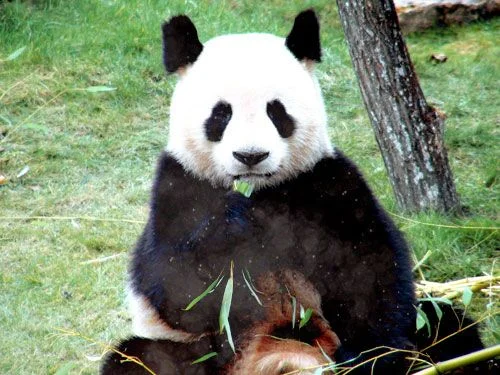Best-Ever 48th Birthday: Volunteering for China’s Pandas (Joy Chen)
To see and hear the original article read by writer Joy Chen, visit Joy Chen's website.
Best-ever 48th Birthday: Volunteering for China’s Pandas
This summer, I spent my 48th birthday in the remote mountains of Sichuan, volunteering as an ambassador for Operation Earth and China’s panda conservation program. I was so honored that my benmingnian was launched with an unforgettable bonfire banquet hosted by the local Qiang people. The embroidery, language, singing and dancing of our Qiang sisters are all simply spell-binding.
The Qiang ladies who sang and danced for my 48th birthday.
Even though I was born and raised in the United States, I’ve always enjoyed a special connection with China’s pandas. I was born in 1969, at a time when the world regarded China as a strange, poor, backwards and isolated place. This image also informed America’s impression of the few of us Chinese who lived in the States. America saw us as polite, meek — and foreign.
...I journeyed to Wolong to visit China’s panda conservation program.
I’d had a brief career as a biologist. Actually, I should say my biology career was very very brief, because it consisted of a single year as a marine-biology major at Duke, before I transferred out to study the humanities. But as they say, “a little bit of knowledge can be a dangerous thing.” And this summer, the mini-biologist inside me had some tough questions for the panda conservationists.
To wit: Should we be saving pandas at all? As a species, they seem to be lacking on a number of fronts. They’re obviously bad at sex, their fertility windows are unreasonably small, and when they’re not sleeping, they do nothing but eat. That’s because their diet consists of almost nothing but non-nutritious bamboo, a plant that’s disappearing in the wild. Sure, pandas are darn cute but, I wondered, have pandas as a species simply gone down an evolutionary dead-end? If nature has decided it’s time for pandas to go, should humans be trying to save them at all?
Zhang Hemin, the Panda Daddy of China.
Well, I gained an education there in Wolong. I learned from the best. Zhang Hemin is the "Panda Daddy" of China, who for decades as led China’s panda conservation program. Mr. Zhang has a colorful personality and his enthusiasm is infectious as he describes how they use Viagra and panda porn videos to help males get into the mood to learn how to do the deed. By now, he and his team have become so successful in helping captive pandas procreate that they are working on training the baby pandas for life in the wild, in order to expand the overall genetic diversity of the species.
And I met Leon Chen, the former United Nations environmental official who founded Operation Earth. Leon explained to me that the panda is an ancient species which has survived on our planet for millions of years, through the Ice Age that killed off many other mammals. Unusual among mammals, the panda has evolved from carnivore to herbivore, and its amazing survival through time holds important lessons, particularly as we humans must learn more about how to adapt to our rapidly-changing environment.
Baby pandas in “panda kindergarten.
Leon taught me that in fact, the existential threat to pandas is not evolutionary. Actually, pandas were doing fine, until humans came along. The threat to pandas’ existence comes from the fact that humans have fragmented and destroyed their habitat through climate change and physical development. After all, animals that have evolved for millions of years can’t just change in a few decades as people move in, destroy their habitat and eliminate their food source.
Saving the pandas is not just about saving the pandas. It’s about saving an entire ecosystem in Western China. By eating bamboo and distributing bamboo seeds, pandas allow the forests of Western China to survive and provide a habitat for the birds, insects, and mammals that live there, including untold numbers of rare plants and animals.
In fact, saving the panda is not even just about saving one ecosystem. It’s about saving our planet. As a species indigenous only to China, pandas are China’s international symbol of friendship and peace. And they are perhaps the world’s most adored species of animal. Conserving and presenting pandas in zoos is really about getting the world’s people to care about biodiversity and conservation. So, helping secure a future for pandas is also about helping secure a future for homo sapiens.
I was honored to have the privilege of spending my 48th birthday with a new generation of these ancient and modern creatures.
Having kicked off my benmingnian ("ben ming nian") with such a bang, I feel I’d better make my next 12-year cycle count and seize the time to do some good in the world. If I retire at around 96 years old, I only have four more cycles to get things done. Time is limited; must wisely use the coming years.
###











